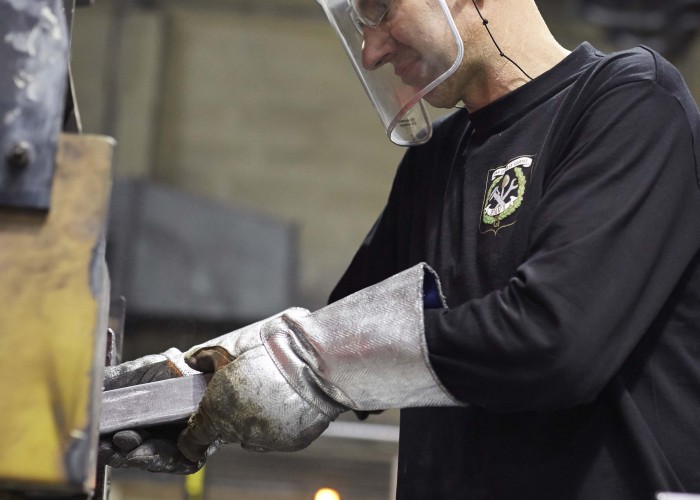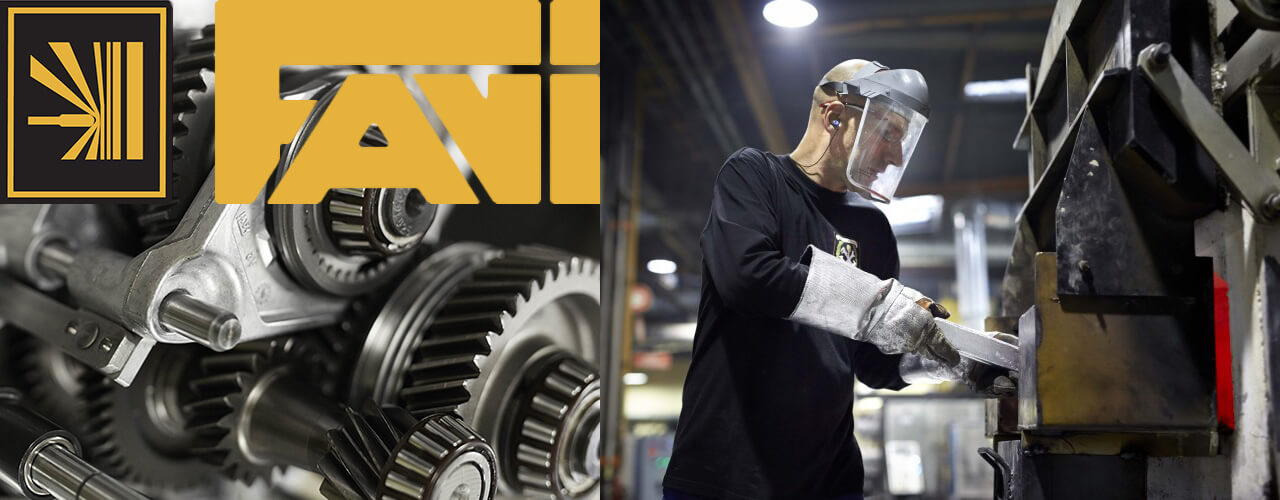Favi is a remarkable company: While most examples of companies with a human-first culture seem to be build from the ground up that way, are relatively recent, and come from a internet technology background, Favi was an old-school family owned brass foundry, founded in 1953, when Jean-Francois Zobrist took over as CEO in 1983. The way he became CEO was remarkable as well: the owner took Zobrist on a helicopter tour, landed near the plant, gathered the employees, and told them Zobrist was their new CEO, not in the last place to the surprise of Zobrist himself.
What can you expect from this article?
- Read the inspiring story of Favi.com
- An example from a production factory, and not the typical consumer organization
- A practical example of a change of the typical hierarchical silo organization into a value stream structure
- An inspiring example of putting humans first, and reverse delegation
The hierarchy
Structure
A brass foundry is probably not the first place where you would expect an enlightened leadership style. An old-school hierarchical structure and command & control style leadership is what you expect. Which was exactly what Zobrist found when he started. Yet, nowadays, a hierarchy is exactly what is largely absent at Favi. Favi is a very flat organization divided into small teams, or mini factories, of workers that serve their own client, organize their own work, do their own planning,etc.
There a no typical staff departments like HR, Planning, or Procurement. Why not? because the teams all take care of those activities themselves, locally. The huge advantage of this is that staff activities will no longer optimize their local work at the expense of the business they are supposed to support, a phenomenon I see in almost all companies that do have these staff departments. We cannot blame those departments though, they just try they to realize the goals they were given, and making the KPI’s they got. But at Favi everyone in a team has the same goals and KPI, so they just have to work together to reach the goals.
Mini factories
The entire organization of Favi is split into 21 mini factories of 20 – 35 operators each. Some of them are support factories like laboratory and administration. Most are production units organized around either client, mostly automotive manufactures, or a products sector like water meters or rotors. The mini factories are almost completely self-sufficient, self-responsible, and self-organizing. A mini factory is characterized by their own geographical grouping of machines, their own floor and machines color, and sometimes even their own logo (that of the client).
Each mini factory has one leader, an experienced operator, who was at some point elected by his colleagues. While the leader has a broad range of responsibilities the operators also have a large degree of freedom. Responsibility does not equal authority.
A mini factories receives and fulfills its own orders. The daily work is planned, but operators work at stations based on both their competence and preference. This way operators get a chance to learn all machines and even more than one mini-factory which greatly enhances the flexibility of the mini factory to organize its own work with a relatively small group of operators. The leader has a competence sheet (see our practice of competency matrix) helping him to get the people he needs at the right moment. This is a totally informal proces: while the leader can request for person B, person B can decline but then has the responsibility of finding a replacement of equal competence himself.
Favi’s structure of mini factories is an example of breaking the silos of a typical hierarchical silo organization into a value stream format. See our article: From silos to value streams.

“I was aware that in order to become a responsive organization, decisions needed to be made by the workers themselves, directly on the production floor. I believe that a good employee is an employee that takes initiatives. All our employees were taking initiatives when they were at home, but our organizational structure was solely focused on preventing any form of initiative from the same employees. I felt the need to remove this structure and designed a new one based on so called mini-factories. A structure that consisted solely of two layers; operators and leaders.”
Sales
Favi employs about a dozen sales representatives. Most of them started in production. Their job is to bring the client closer to the mini factory and the mini factory closer to the client. For example the sales representative shares all information he gathers about the client with the operators of the mini factory, both in informal as well as formal events. Sometimes he invites a client representative to come over to the factory to directly answer questions of the operators, and whenever possible his brings his entire mini factory to a tour at the client’s premises.
Again the sales has a broad range of responsibilities and freedom to organize his work without any further formal reporting structure. Sales bonuses, the typical performance drug of sales organizations, is absent too. Remember that both the operators and the sales rep have the same goals, so the typical distance between sales and operations is absent at Favi.
Philosophy
Theory Y
While being appointed by the owner as CEO, Zobrist lay his faith in the hands of Favi’s management by offering to leave every five years if they were not satisfied with him.
Zobrist was a strong believer of Theory Y, the assumption that men wants to do meaningful work and does not need to be controlled. If you provide people space, they will not abuse it but use it to develop themselves. For this reason Zobrist started to remove time clocks, bonuses, HR department, procurement, etc.

The story of the janitor at Favi
The story is about Christine, a night janitor at Favi, who took a call in the evening because there was nobody else present to take the call. It turned out to be a client who just landed at the airport and expected to be picked up. Christine didn’t know this was actually an auditor from Fiat, an important new customer. But she arranged a pickup spot and time and hung up.
The next morning Favi’s CEO Zobrist was surprised to see the visitor waiting for him in his office, because he had waited for him the previous day until 19:00 and then went home, expecting something had come up. The visitor explained that he could only call after he landed and was pleasantly surprised that someone answered the phone when he called the office the previous night. A woman had picked him up from the airport and drove him to his hotel.
It took Zobrist some time to find out who the mystery chauffeur was. As it turned out, Christine just took the keys of a company car, picked up the visitor from the airport, drove him to his hotel, and then went back to the office to finish her work hours later. Also, she didn’t even feel the need to tell anybody what she did. As far as she was concerned a customer was expecting to be picked up at the airport, an obligation made by the company that only she could fulfill at the moment. And she didn’t expect any praise for it either because for her it was just the right thing to do. As Zobrist put it: She is not a janitor. She is the company.
Give them what they need
Zobrist realized that people wanted to contribute and take responsibility if you only get out of their way and remove all obstacles. For instance, he replaced adjustable wrenches that were provided to operators to save money with a full kit of wrenches. Employees also received a budget to buy whatever they wanted, as long as it was related to their work.

The story of replacing gloves
One day, while touring, I met Alfred, who was waiting in front of the warehouse. (we always wait in front of warehouses, even when we are alone!) I asked him why he was there and he said: “Chang’ gloves”. And he added “got voucher from boss and old gloves”. The rule was the following: when an employee had old gloves, he had to show them to his boss, who was writing a voucher. With this voucher he was going to the warehouse, was chatting a bit on the way, was going to toilets, then rang at the warehouse door, waited for the store employee to come, and in exchange of the voucher was receiving the new gloves. The whole process took around 10 minutes! I went to accountancy and learned that the machine on which he was working was costing 600 FF/hour so 10 FF per minute and that the gloves where costing 5,80FF. I thought then that it was making the gloves a bit expensive, and that without promoting stealing, even if the employee was taking a pair from time to time for gardening, everyone would largely win.
The lock to the storage was removed. Everyone was free to take what they needed. They didn’t even have to register with their name, just with what they took so stock could get replenished in time.
Never deliver late
An important mantra of Favi is to never deliver late. Here’s a typical story:
One time, a Friday around 11:00, Valerie, supervising a mini factory came to see me, close from a nervous breakdown, saying: “We will deliver late, we will deliver late!” I answered: “No Valerie, it is not possible!” “It is! I have the parts for the client, but I forgot to organize transport and we promised the delivery for 14:00 in Brittany!” I said: “It is not that dramatic, we will call a helicopter”. A helicopter came on the yard in front of the factory so that everyone could see it. It took with it only part of the production planned, but that was not important. What was important
was that we proved to ourselves that we were always respecting the deadlines. I knew the manager from the factory, who called me: “We saw a helicopter arriving with pieces from your factory. You are crazy! We were not at plus one or two days! I did not know that you started to smoke herb…” I told him: “It is not for you that I rented the helicopter! It is for us, to prove us that we can never deliver late!”
Backward delegation
Zobrists supports the idea that authority start at the frontline workers instead of top management. They pass some authority up the chain. This meant the mini factories assumed all authority they deem necessary like production, planning, purchasing, finance, etc.
Zobrists quotes Francois Julien:
“The good prince is one who, by eliminating the constraints and the exclusions, allows everyone to blossom as he wishes.”
Conclusion
Favi remains to be a market leader. Half of all cars build in Europe have their gearbox forks. Favi has been so consistent on pricing it is even able to export products to China.
The way it achieves this goes against conventional wisdom that prevails in most organizations. It is an inspiring proof that putting humans first, and radical decentralization, can lead to better performance.
Bibliography
List of notes and sources we reference from.
Notes
- The story of Favi
- Freedom Inc. Brian M. Carney, Isaac Getz. Somme Valley House
- Reinventing Organizations. Frederick Laloux. Nelson Parker
- https://corporate-rebels.com/zobrist/

